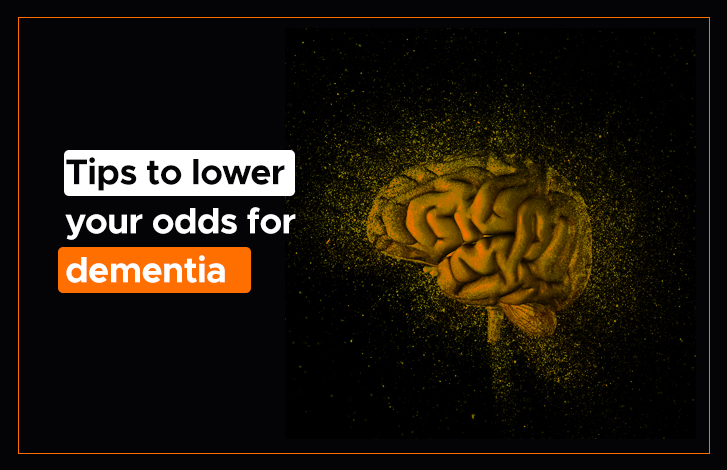Dementia, although not particularly a disease, can be defined as the reduced ability to remember, think, and make decisions. This reduces the capacity to perform daily tasks and can interfere with normal daily function in affected patients.
This disease is not only common in older individuals, but in cases of early onset, it affects younger patients as well. Dementia ultimately results from various diseases and injuries that affect the brain.
About 60–70% of dementia cases are a result of Alzheimer’s disease. Alzheimer’s is a neurodegenerative disease that largely exhibits signs of dementia in geriatric patients. Sometimes it even affects a person’s response to their surroundings.
According to WHO, the severity of dementia can be highlighted by the fact that, globally, 55 million patients suffer from it. These figures rise by 10 million each year.
Furthermore, dementia is the 7th leading cause of death in the world and one of the largest reasons behind the increased dependency and disability of older adults across the world. Therefore, managing dementia is essential to improving geriatric patient health.
Although there is no cure for dementia and researchers have not yet found a way to prevent it. Healthcare providers are certain that with the help of lifestyle modifications and diet, the risk of dementia diagnosis can be reduced.
Here are the 5 tips to help lower the risk of dementia:
Being Physically Active
A research published in the British Medical Journal (BMJ), clearly highlights the effect of improved physical activity on the incidence of dementia.
This research concluded that physical activity had been a ‘protective factor’. The 250 000 participants in the study with dementia were protected for up to 20 years after its inclusion in their daily routine.
Additionally, being physically active positively impacts weight, which is another contributing factor to dementia.
Improved physical activity improve overall health. Furthermore, it allows older patients to be more active and independent while also reducing the risk of disease.
While the thought of exercise may be daunting for some, it does not necessarily have to be intense. Allow yourself to enjoy this time by indulging in yoga or other aerobic activities such as swimming.
Wearable Health Gadgets
To complement your daily workout routine, try wearing health gadgets that record and help track workouts.
These gadgets not only record heart rate and distance, but they can also help keep patients motivated by setting small yet achievable goals.
These can contribute to better health outcomes for individuals by encouraging them to remain healthy and active.
Eating Healthy
It can be noticed that individuals who consume a diet that is less nutritious or largely composed of junk can have low energy levels. This makes them more lethargic and, therefore, results in a sedentary lifestyle.
Furthermore, fewer nutrients will eventually result in lower body immunity, increasing the risk of acquiring several diseases.
While there is no supplement or nutrient that can help improve brain health, a variety of collective nutrients can help boost brain function.
For this, try incorporating whole grains such as rice, bread, and pasta, fish, and fresh fruits and vegetables into your diet.
Alternatively, you can use plant-based oils to cook food and avoid high cholesterol and oily food substances.
Furthermore, when choosing dairy products, opt for low-fat options and try to reduce the consumption of red meat on a daily basis.
Stop Smoking
Smoking is a dangerous habit that reduces the body’s circulation by constricting the blood vessels. Smoking reduces the amount of blood. This, consequentially, reduces the amount of oxygen that reaches the brain as well as the lungs.
According to a recent report, the WHO claims that 14% of Alzheimer’s cases can be attributed to smoking. This is one reason why the 2017 Lancet Commission ranked smoking third among the nine important risk factors for dementia.
While quitting cold turkey may not be the easiest. It is imperative that you speak to your general physician to work out an action plan to quit smoking.
Be Socially Active
Stress and reduced mental stimulation are not directly related to dementia. However, it is worth noticing that prolonged periods of stress and loneliness can contribute to certain forms of the disease.
Therefore, it is important to indulge in social situations and remain mentally active in old age. To do this, you can join a class, or be part of a social group. Additionally, you invite friends over regularly for games and crossword puzzles.
You can also take part in arts and crafts, take a course, learn a new language, or even write in your journal.
Any activity that allows you to engage your mind, interpret information can be beneficial. Games that promote decision making while enjoying the company of friends and like-minded individuals, is a healthy social activity for the brain.
Bottom Line
Dementia can be a debilitating disease for geriatric patients. It can cause patients to dissociate from friends and family and exhibit signs of depression and apathy.
Not only is dementia difficult for patients, but the disease also adversely impacts friends and family.
Therefore, ensure optimum health in older family members. Encourage them to lay emphasis on the aforementioned tips to prevent Dementia. Also, allow them to be more social and active and consume a healthy diet to boost brain health, immunity and ward off disease risk.







